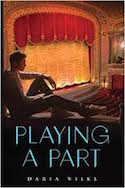
Playing a Part
Written by Daria Wilke
Translated by Marian Schwartz
Arthur Levine, 2015, 176 pp.
ISBN: 9780545726078
It is difficult to be different, to fight constantly for your right to be different, and to play the part of a jester instead of living your life. Originally published in Russia in 2013, Daria Wilke’s Playing a Part is published by Arthur A. Levine Books (Scholastic) in a translation by Marion Schwartz. The main character of the book is Grisha whose parents are actors in a puppet theater in Russia. Grisha is a theater kid who spends half of his life behind the stage. In the book, the puppet theater becomes a symbol of the whole world with its rights and wrongs, love and hatred, care and betrayal.
The theater is a refuge for Grisha when the outside world is less hospitable. His relationships with former school friends are falling apart; they constantly bully him for being, as they see it, a sissy. His true friend and role model is Sam, an actor who is about to emigrate from Russia because he is bullied as a gay man. He is the best puppeteer in the theater and plays the part of a jester in one of the theater productions. Sam is an old friend of Grisha’s parents. When Grisha was a baby, Sam was his babysitter and later he helped Grisha with his homework. Grisha struggles to find his identity amidst the bullying, although he does not yet know whether or not he is gay. What Grisha is fighting for is right to be himself. Joining him in his fight is brave tomboy Sashok, the daughter of actors-puppeteers.
The jester is Grisha’s favorite puppet; he hopes to own it when the production of the play is over. Grisha himself often feels like a jester; he makes constant jokes and is playing a part because it is easier to avoid being mocked and bullied. But one day the jester puppet is sold to a rich collector. Despite feelings of personal loss, Grisha is determined to make a new jester puppet for Sashok who is about to have a serious operation. For the sake of friendship, he is ready to sacrifice his wants and needs for those of his friend.
The gay theme is quite significant in the book. This is a first book for young readers in Russia which openly involves gay characters, and may be the last because of the new Russian law that prohibits mentioning a gay theme in books for readers under 18. The designated age is to be displayed on the cover of all books. This book is clearly addressed to young readers, and in the United States the suggested age is 12 and up.
In this coming of age novel, the focus on being gay stands for the many choices adolescents need to make. First of all, is freedom of choice, any choice, not only of sexual orientation. It is also about the need to stand against the peer pressure and to search for one’s individual way. The book can be read together with John Green’s Looking for Alaska (2005) and Louis Sachar’s Holes (1998). In terms of the puppet theater theme, it can be paired with The Master Puppeteer (1975) by Katherine Paterson.
Daria Wilke was born and raised in Moscow in a family of puppeteers, just like her main characters, Grisha and Sashok. Now she lives in Vienna, Austria. She has written other pieces of fiction and plays for children, although her books have not yet found their way to American readers. Playing a Part is translated by Marian Schwartz for whom this is a rare venture into the realm of young readers’ literature. She is well known for her excellent translations of classics and contemporary Russian authors, such as Leo Tolstoy, Mikhail Bulgakov, Yuri Olesha, and Mikhail Shishkin.
Olga Bukhina, International Association for the Humanities, New York City
WOW Review, Volume VII, Issue 3 by Worlds of Words is licensed under a Creative Commons Attribution-NonCommercial-ShareAlike 4.0 International License. Based on work at https://wowlit.org/on-line-publications/review/vii-3/
